
Ashok Dave is a Gujarati language humorist and columnist from India. Apart from his weekly humor columns, he writes columns on old Hindi films and music.

Ashok Dave is a Gujarati language humorist and columnist from India. Apart from his weekly humor columns, he writes columns on old Hindi films and music.
He was born on 29 February 1952 in Jamnagar, Gujarat, India. [1] He started writing in 1969 and a year later, he wrote Kaji Duble Kyu? in Sandesh on a weekly basis. [2]
His humor books include Ashok Dave ni Sixero, Ashok na Sheelalekho, Baporiyu Encounter, Black Label, Coffee House, Eveningyu Encounter, Jenti Jokham, Mera Mumbai Mahan, Morningyu Encounter, Pet Chhuti Vaat, Rangbirangi, Sui Kiyo Chho?, Ashokna Updesho, Budhvarni Bapore.
Film Sangeet na e Madhura Varsho, Hero-Heroine and Muhammad Rafi are his books on Hindi film music and industry.
Ashok Dave wrote "Budhvarni Bapore" every Wednesday in Gujarati daily Gujarat Samachar . His question/answer column "Encounter" was published every Sunday. "Koi Door Gaye" was his column on old Hindi film music published every Friday. [3]

Kathiawar is a peninsula, near the far north of India's west coast, of about 61,000 km2 (23,500 sq mi) bordering the Arabian Sea. It is bounded by the Gulf of Kutch in the northwest and by the Gulf of Khambhat in the east. In the northeast, it is connected to the rest of Gujarat and borders on the low, fertile hinterland of Ahmedabad. It is crossed by two belts of hill country and is drained radially by nine rivers which have little natural flow aside from in monsoon months, thus dams have been built on some of these. Kathiawar ports have been flourishing centres of trade and commerce since at least the 16th century.

Narsinh Mehta, also known as Narsinh Bhagat, was a 15th-century poet-saint of Gujarat, India, honored as the first poet, or Adi Kavi, of the Gujarati language. Narsinh Mehta is member of Nagar Brahman community. Narsinh became a devotee of Krishna, and dedicated his life to composing poetic works described as bhakti, or devotion towards Krishna. His bhajans have remained popular in Gujarat and Rajasthan for over 5 centuries. Most notably, his composition Vaishnav Jan To was Mahatma Gandhi's favorite and became popular with freedom fighters across India.
The history of Gujarati literature may be traced to 1000 AD, and this literature has flourished since then to the present. It is unique in having almost no patronage from a ruling dynasty, other than its composers.

Kumarpal Balabhai Desai is an author, critic, editor, journalist, columnist and translator from Gujarat, India. He studied and later taught at the Gujarat University. He is associated with several social and Gujarati literary organisations such as Gujarati Sahitya Parishad. He has written and edited more than hundred books including biographies and several works on Jainism. He was awarded the Padma Shri in 2004.

Tarak Janubhai Mehta was an Indian columnist, humourist, writer and playwright who is best known for the column Duniya Ne Undha Chasma, and was a well-known figure in Gujarati theatre.

Shahabuddin Rathod is a Gujarati scholar, teacher and humorist. He was awarded Padma Shri in the field of literature and education in 2020.

Gujarati cinema, also known as Dhollywood, is the segment of Indian cinema, dedicated to the production of motion pictures in the Gujarati language widely spoken in the state of Gujarat. It is based in Ahmedabad. It is one of the major regional and vernacular film industries of the cinema of India, having produced more than one thousand films since its inception.
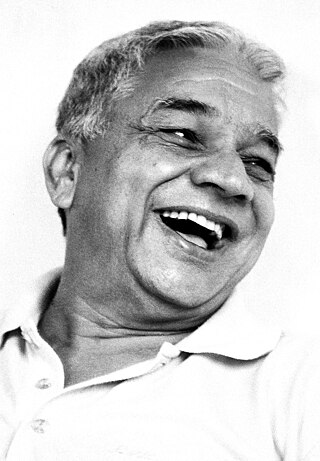
Vinod Bhatt was a Gujarati humour essayist and biographer from Gujarat, India.
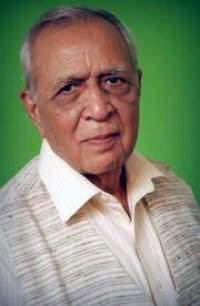
Bholabhai Patel was an Indian Gujarati author. He taught numerous languages at Gujarat University and did comparative studies of literature in different languages. He translated extensively and wrote essays and travelogues. He was awarded the Padma Shri in 2008.

Madhu Rye is a Gujarati playwright, novelist and story writer. Born in Gujarat and educated at Calcutta, he started writing in the 1960s and became known for his stories and plays. His experience at the University of Hawaii introduced him to experimental writing and improvisations as writing aid, which later led to a movement against absurd theatre. He moved to the US in 1974 and has lived there since. He chiefly wrote novels, short stories and plays. His plays were successful and have been adapted into several languages and media. He has adapted his novels into plays and some plays into novels. The most notable is Kimball Ravenswood, which was loosely adapted into a Hindi TV series Mr. Yogi (1989), and a Hindi film, What's Your Rashee? (2009).

Dhvanit Thaker is Gujarati actor and singer from Ahmedabad, Gujarat, India. He formerly worked as a radio personality from 2003 to 2021.
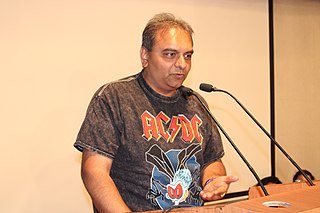
Jay Vasavada is Gujarati language writer, orator and columnist from India. Born in Bhavnagar and brought up in Gondal, Gujarat, he writes columns in various publications since 1996. He has published several books compiling his columns.

Kaajal Oza Vaidya is an author, screenwriter, radio personality and journalist from Ahmedabad, India. She initially worked as a journalist and actress. She has written more than 56 books including novels, short stories and essays. She has written stories, dialogues and scripts of soap operas and films. She writes columns in several publications and hosts a radio show.
Kanti Bhatt was an Indian author, journalist and columnist who is estimated to have written more than 45,000 columns in several Gujarati publications. Bhatt became a journalist in 1966 and served as the subeditor of Vyapar in 1967. He later became a freelance journalist and wrote columns for several Gujarati publications including Chitralekha, Mumbai Samachar, Janshakti, Sandesh, Yuva Darshan and Jansatta. He worked in Kenya for some time in 1977. He was an investigative journalist and also wrote daily columns titled Aaspaas and Chetnani Kshane in Divya Bhaskar.

Anil Chavda is a Gujarati language poet, writer and columnist from Gujarat, India.
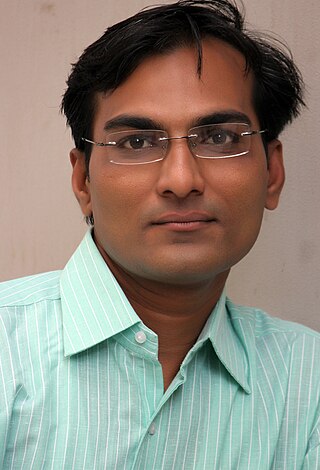
Ashok Chavda, also known by his pen name Bedil, is a Gujarati poet, writer and critic from Gujarat, India. His anthology of poetry, Dalkhi Thi Saav Chhutan (2012), was awarded the Yuva Puraskar by the Sahitya Akademi in 2013. His collection of known writings include Pagla Talaavma (2003), Pagarav Talaavma (2012), Tu Kahu Ke Tame (2012), Pityo Ashko (2012), Shabdoday (2012), and Ghazalistan (2012), which is a translation of Urdu ghazals written by Indian and Pakistani poets. He is also a recipient of the Yuva Gaurav Award (2012) from the Gujarat Sahitya Akademi, and the Dasi Jivan Award (2013–14) from the Government of Gujarat. He has appeared in several TV and radio programs on All India Radio and Doordarshan.
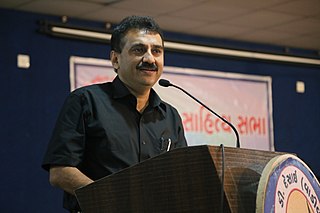
Raeesh Maniar is a Gujarati language poet, translator, playwright, columnist, compere, lyricist and script writer from Gujarat, India. His significant works include Kafiyanagar (1989), Shabda Mara Swabhavma J Nathi (1998) and Aam Lakhvu Karave Alakh Ni Safar (2011). He has written two reference books for students of ghazals, Ghazal: Roop ane Rang (2006) and Ghazal Nu Chhandovidhan (2008). The later work contains original research that may be applicable to prosody of all north Indian languages. He has written lyrics for several Gujarati and Hindi language movies. The Indian National Theater of Mumbai awarded him the Shayda Award for 2001 and the Kalapi Award for 2016 for his contributions to Gujarati ghazal poetry.

Pravin Pandya is a Gujarati language poet, writer, playwright and dramatist from Gujarat, India. His significant works include Ajavasnan Matsya (1994), India Lodge (2003), Hathiraja Ane Bija Natako (2004) and Barda Na Dungar (2009). He is noted in Gujarati literature for his theatre activism and his dramatized adaptations of Hindi poet Shamser Bahadur Singh's works. He won Uma-Snehrashmi Prize (2008–09) for his book Barda Na Dungar.
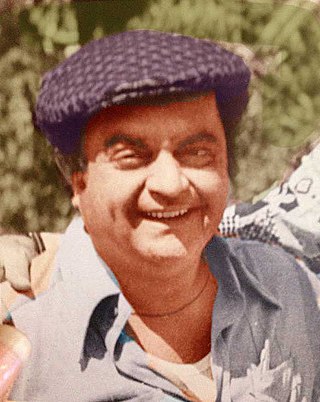
Arun Bhatt (1934–2001) was an Indian film director and producer active in Hindi and Gujarati cinema during the 1970s and 1980s.
Mulshankar Mohanlal Bhatt (1907–1984) was Gujarati translator, biographer, children's writer and educationist from Gujarat, India. He is known for translating works of Jules Verne in Gujarati.